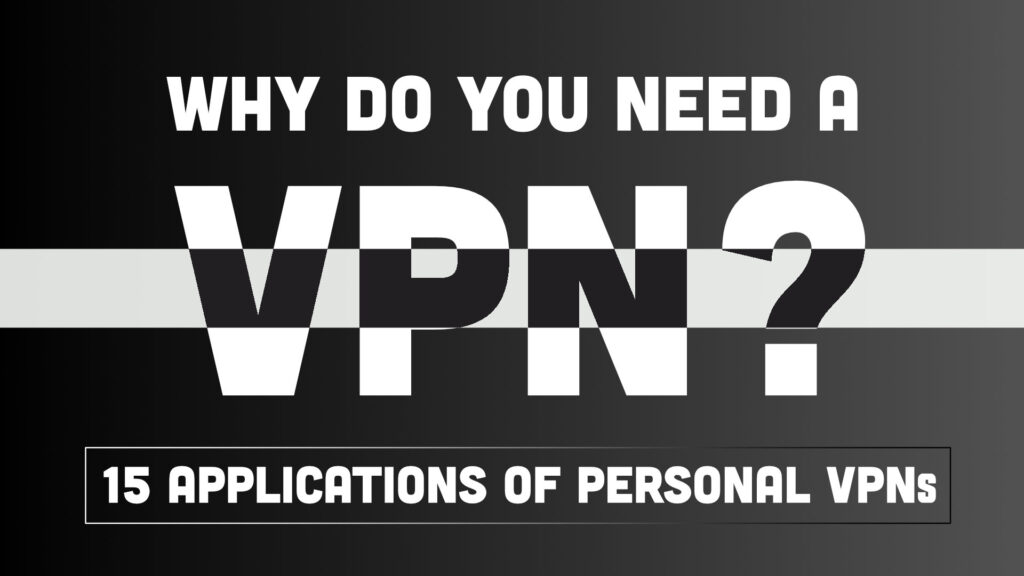15 Applications of VPNs (Personal Virtual Private Networks)
Are you looking for a comprehensive answer to the question, “Why do I need to use a VPN?” Read a few applications of VPN (Personal VPN) below.
But first, What is a VPN?
In simple words, VPN is the encrypted connection between your device (Computer, Phone, etc.) and a VPN Server. This VPN Server is provided by a service provider whose VPN client you’ll need to download and install on your device.
Once you connect to the service provider’s VPN server securely (through an encrypted tunnel), the service provider will provide a new IP address for your session. When you visit any website, that site will only see this new IP address (from the VPN server) and not your old/original IP address. This enables you to browse anonymously.
If you are looking for info on enterprise VPNs, click here.
There are both free and paid personal VPN services available in the market.

Here are 15 compelling Applications of VPNs –
To make browsing safer – Since VPNs are encrypted end-to-end communications over the Internet, it is difficult for others to track your online activities.
To make browsing on Public Networks safer – For the same reason mentioned above. Also, hackers target people connected through public networks to launch attacks and try to take over your device. Using VPNs can make it more difficult for them.
To see websites/stream audio-video content available only in other regions – When you sign up with a VPN provider and connect to one of their servers, you get assigned an IP address belonging to the region where the server is located.
For example, if you are in the US and connect to a VPN server located in Australia, your session will be assigned an Australian IP address. Any websites you visit thereupon will assume you are connecting from Australia and provide you all the services only offered to Australians.
To secure your privacy – You may not want certain websites/services you visit “track” you and bombard you with retargeting ads (for example). If you connect through a VPN server, you can ensure your privacy.
To access websites/services that are blocked in your country/organization – If certain services or websites are blocked in your country, you can connect to a VPN Server and access them. However, the chances that the common VPN providers are also blocked in such countries are high. But there will always be others that may not (yet) be blocked.
To get better prices – Some services like movie streaming websites, for example, have country-specific pricing structures. So, if you sign up with them through a country’s server (VPN) that offers lower rates than yours, you get a better deal for the same or similar service.
To enable Free Speech – Through a VPN, you can speak your mind without disclosing your identity.
To Pay Anonymously – If you pay using Crypto wallets (for example), you can pay anonymously through VPNs.
To connect to any service from any device Securely – You can connect not only your phone, tablet, or computer to a VPN service, but some VPN providers enable you to connect to them using your Wireless router, streaming media consoles, etc. That enables secure browsing for all the devices you connect to the Internet.
To Work from Home Securely – Most companies mandate their employees to connect to their servers via a secure VPN network. But in smaller companies, this may not be the norm. By connecting to your work network through a personal VPN, you can be sure that your connection and data are encrypted and that others will not be able to eavesdrop on them.
To Reduce Money on Online Bookings – Some services like airline bookings, hotel bookings, car rentals, and even regular e-commerce stores are known to change their prices based on location. It’s better to check the prices from two or three locations (cities/countries through VPN) and order using the cheapest option.
To make VOIP Calls to Phones – Some countries ban cheap VOIP calls to regular phones and force people to use the expensive ISD calling options. With VPNs, you can overcome this limitation and use VOIP services to call regular phones.
To get unbiased search results – Search Engines personalize their search results for every user. You can use VPNs to bypass your search history and get unbiased search results.
To transfer files safely over P2P networks – Peer 2 Peer (P2P) networks – the direct network between user terminals, can be secured through VPN.
To block ads, malware, and trackers – Some VPNs can make your Internet browsing even more secure and private by blocking advertisements, activity trackers, and malware injections. Some paid services can even block specific categories of websites like gambling, adult, drugs, etc.
To reduce ISP Throttling – Internet Service Providers (ISPs) occasionally throttle your bandwidth if they find you’ve been streaming too much video or playing too many games. When you stream video over a VPN, it’s difficult for ISPs to identify your activity.